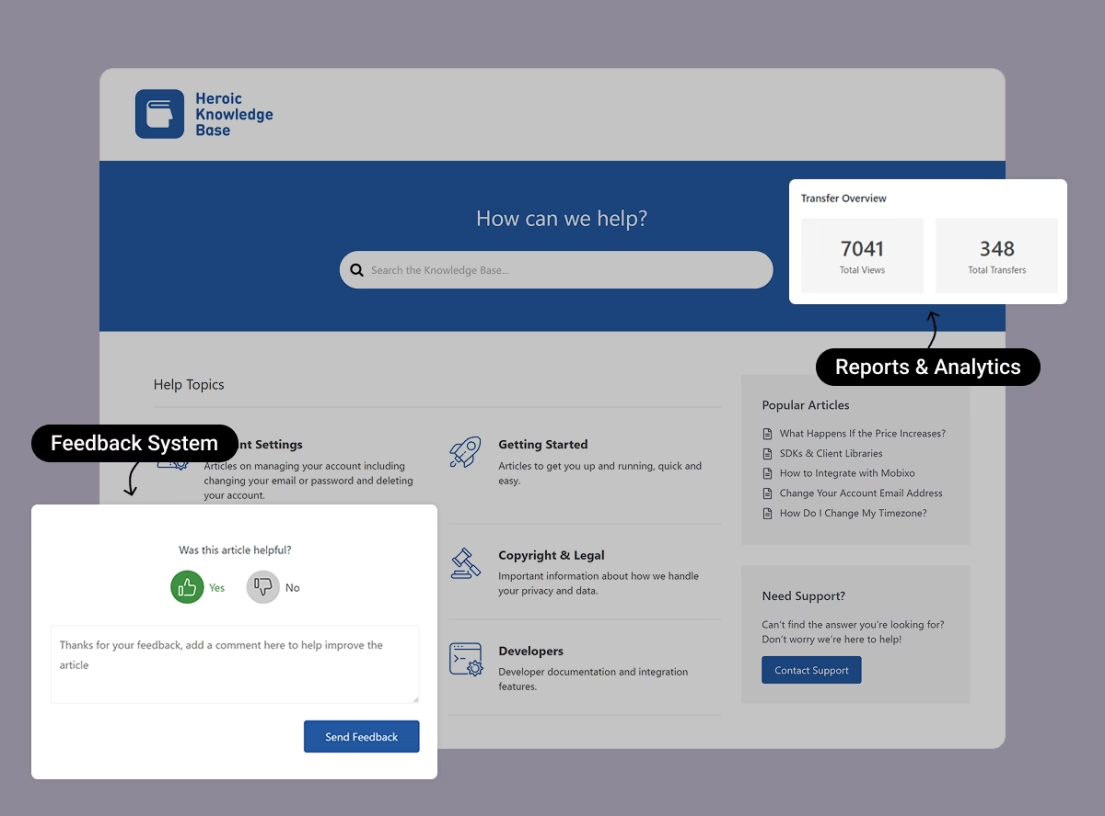What Is a Knowledge Culture? Its Importance, Key Components & Examples

Companies treat “knowledge” like squirrels hoard nuts. One team tuck away crucial info in private folders, another keeps tips in their heads, and newbies end up reinventing the wheel.
🙄 It hurts to admit, but that’s the truth for you.
I remember early in my career losing a veteran employee, and with them went decades of undocumented knowledge.
It felt like someone yanked out a piece of our collective brain. That’s where knowledge culture comes in.
In this guide, I’ll explain what knowledge culture is, why it’s important, and how to build one that keeps your business running smoothly.
Ready? Let’s break it down.
In This Guide
What Is a Knowledge Culture?
A knowledge culture is an environment where sharing know-how is second nature. It’s the opposite of the old “knowledge is power, so keep it to yourself” mindset.
In a company with a strong knowledge culture:
- Employees freely exchange expertise
- Document their insights
- Collaborate to solve problems
All without fear or fuss.
From an academic perspective, knowledge culture is considered a facet of corporate culture that describes how an organization handles knowledge—how it’s identified, acquired, shared, and retained.
Knowledge Culture or Knowledge Management?
Knowledge culture ties closely with knowledge management (KM). The processes and tools to capture and organize knowledge.
You can roll out fancy knowledge management software, but if your culture discourages sharing, those tools will be of no use.
Introducing new tech alone isn’t enough; without leadership support and a culture change, even the best knowledge-sharing system will flop.
In short, knowledge culture is the human side of knowledge management.
It’s the behaviors and beliefs that make knowledge flow freely rather than getting stuck.
When your team believes “we succeed together by learning from each other,” that’s knowledge culture in action.
Key Components of a Knowledge Culture

In my experience, and backed by research, here are the core components that make knowledge sharing culture thrive:
1. Trust and Openness
Trust is the backbone of building a viable knowledge culture.
Team members must feel safe admitting what they don’t know and comfortable sharing what they do.

A trusting, open vibe encourages questions and knowledge exchange without fear of looking silly.
2. Leadership and Strategy
Leadership support is one of the most important factors for a strong knowledge culture.
Leaders must walk the talk. If the CEO and managers openly share information and credit team knowledge, it sets the tone. And your goals should be converted into strategies.
3. Shared Purpose and Values
A knowledge culture flourishes when everyone buys into a common mission: we’re all here to learn and improve together.
That means defining knowledge-sharing as a core value.
Some companies include it in their core values and onboarding.
4. Organizational Structure
Rigid silos and hierarchy can strangle knowledge flow. In contrast, flatter structures and cross-functional teams facilitate knowledge sharing.
If your organizational chart is too complex, establish networks such as communities of practice, which are groups of people from different departments who meet to share expertise.
These communities break down silos. For example, engineers, support, and product folks might form a knowledge-sharing circle.
Companies that excel at knowledge management (KM) often nurture such cross-team forums.
5. Incentives and Recognition
People respond to incentives. If sharing knowledge is rewarded through bonuses, career advancement, or even just a simple shout-out, folks are more likely to do it.
A knowledge culture often includes reward systems to recognize contributors.
These rewards don’t have to be monetary. Even a company newsletter praising “Knowledge Champions of the Month” can motivate others.
6. Processes and Tools
Finally, you need the right processes and tools to support all this human effort.
This includes making it easy to document and find information.
For instance, using a well-organized knowledge base, an internal wiki, or shared drive with clear structure.
A tool like Heroic Knowledge Base can serve as a user-friendly hub for all your documentation and FAQs.

The process part means integrating knowledge-sharing into workflows:
- Code review meetings that capture lessons learned
- Customer support teams that turn solved tickets into knowledge base articles, etc.
When contributing knowledge is just “how we do things here,” culture change sticks.
Why Knowledge Culture Is Important
Why bother fostering a knowledge culture? Because it can make or break your business’s agility and innovation.
Here are some major reasons a strong knowledge culture is crucial:
1. Faster Problem-Solving and Onboarding
When employees actively share know-how, everyone finds answers quicker.
New hires ramp up without banging their heads against unknowns for weeks.
For example, if your company has a practice of documenting solutions in a knowledge base (and a tool like Heroic KB to search it), a new support agent can solve a ticket in minutes by reading an article instead of hunting down a veteran coworker.
2. Avoiding “Reinventing the Wheel” (and Saving Money)
A knowledge culture prevents the scenario where five people solve the same problem five different times in isolation.
A company that centralizes knowledge and encourages reuse will save countless hours (and dollars).
3. Innovation and Continuous Improvement
The culture of knowledge-sharing fuels innovation. Why?
Because when information flows freely, people can build on each other’s ideas.
Employees feel empowered to suggest improvements since they know what has been tried before.
4. Employee Engagement and Retention
Believe it or not, knowledge culture also affects morale.
When people have access to information and opportunities to learn, they feel more competent and valued. They’re not stuck in the dark or constantly frustrated by missing info.
This boosts job satisfaction. Plus, sharing knowledge gives employees a sense of purpose and teamwork. It feels good to help colleagues and be recognized for expertise.
5. Resilience to Turnover
Every organization faces employee turnover eventually. Retirements, departures, etc.
Without a knowledge-sharing culture, each exit can feel like a devastation, as critical know-how walks out the door.
A strong knowledge culture turns individual knowledge into institutional knowledge.
When knowledge is routinely documented and shared, you reduce “single points of failure.
Examples of Knowledge Culture in Action
Toyota: Teaching Every Worker “Why” and “How”

One classic example is Toyota, the auto manufacturer known for its Toyota Production System (TPS) and relentless improvement.
Toyota’s culture has long treated knowledge as a collective asset. They distinguish between explicit knowledge (documented processes) and tacit knowledge (experience in people’s heads), and make a concerted effort to share both.
How does Toyota do it?
One way is through a practice called the Job Instruction (JI) document.
Every critical task in a Toyota factory is distilled into a JI document that any worker can follow.
But it’s not just a dry checklist. A JI document includes:
- The step-by-step procedure
- The key points (tips to save time or avoid errors
- The reasons behind each step
With this, employees aren’t just told what to do, but also why it matters.
Hundreds of these documents collectively capture Toyota’s manufacturing knowledge, so a new hire on the assembly line can learn proven best practices on day one.
How to Cultivate a Knowledge Culture in Your Organization

Here’s my playbook for cultivating a thriving knowledge culture. It’s a blend of personal experience and best practices:
1. Lead by Example from the Top
Change starts at the leadership level. If you’re a founder or manager, model the behavior you want to see.
Share information openly. Whether it’s business performance data, lessons from a failed project, or a personal “I learned this the hard way” story.
When leaders admit what they don’t know and actively ask others for input, it normalizes curiosity and collaboration.
Make knowledge-sharing part of team meetings.
Does anyone have insights on this issue?
When your team sees that you value their knowledge and you’re willing to learn from them, it sets a powerful precedent.
2. Break Down Silos and Encourage Collaboration
It’s hard to have a knowledge culture when teams operate in isolation.
Facilitate more cross-pollination of ideas.
This could mean creating cross-functional teams for projects, or setting up informal meetups (virtual or physical) where people from different departments share what they’re working on.
Some companies also do rotational programs like job shadowing, where an engineer might sit with customer support for a day to exchange knowledge (and empathy!).
You can also use a platform like Slack or Microsoft Teams with dedicated channels for Q&A, tips, or “Here’s something cool I learned.” The easier you make it for people to connect and discuss, the more knowledge will flow.
3. Design Easy Processes for Knowledge Sharing
One big barrier to sharing is simply “I don’t have time” or “It’s too cumbersome.”
Reduce the friction.
Integrate knowledge capture into existing workflows so that it doesn’t feel like extra work.
For example, if your support team closes a ticket, have a quick checkbox or prompt: “Does this solution belong in the knowledge base?”
With a system like Heroic Inbox, you can easily create these types of workflows.

4. Implement the Right Tools
While culture is mostly about people, technology is an essential enabler.
Provide a central, accessible place for knowledge to live.
This might be an internal wiki, a shared Google Drive with good organization, or a dedicated knowledge base platform.
A software like Heroic Knowledge Base can quickly give you a professional knowledge portal where employees (or customers) can search for answers 24/7.
The key features to look for are a robust search function, easy content creation (so non-techies can add articles), and feedback mechanisms.
5. Create Incentives and Recognize Contributors
This can be one of the most fun parts of building knowledge culture—celebrating the knowledge heroes.

There are many ways to do it:
- Give out monthly or quarterly awards for the “Most Helpful Article” or “Top Knowledge Sharer,” with maybe a gift card or simply public kudos.
- During team meetings, recognize someone who uploaded a great tutorial or spent time mentoring a colleague
- You can even gamify it a bit.
Be careful not to make it too competitive, it’s about sharing, not scoring points.
6. Hire and Onboard for Knowledge Culture
Finally, sustain your culture by bringing in people who embrace it. During recruitment, look for signs of collaboration and curiosity.
You can ask candidates to describe how they’ve helped coworkers in the past, or how they learn new skills on the job.
Their answers give insight into whether they’ll hoard info or share freely.
Once hired, immerse new employees in the knowledge culture right away.
Final Thoughts
Building a knowledge culture is an ongoing journey. Start small, with one team or one practice, and grow it.
Solicit feedback on what’s working or what isn’t. Maybe the team finds the wiki clunky but loves the lunch-and-learns. Adjust accordingly.
Keep the conversation about knowledge going. Over time, these practices will become habits, and those habits will become your culture.
As a leader, your role is to consistently nurture this culture by removing barriers, cheering on contributors, and emphasizing the “why” — that when we share what we know, we all become smarter and more successful.
Further Reading
Tribal Knowledge: What It Is & How To Start Capturing It
What Is a Knowledge Base? Its Types, Benefits and Best Practices
Knowledge-Centered Support (KCS): What It Is, Best Practices
Knowledge Sharing: What It Is & Why It’s Important for Businesses?
Knowledge Transfer: What It Is And How to Implement It



